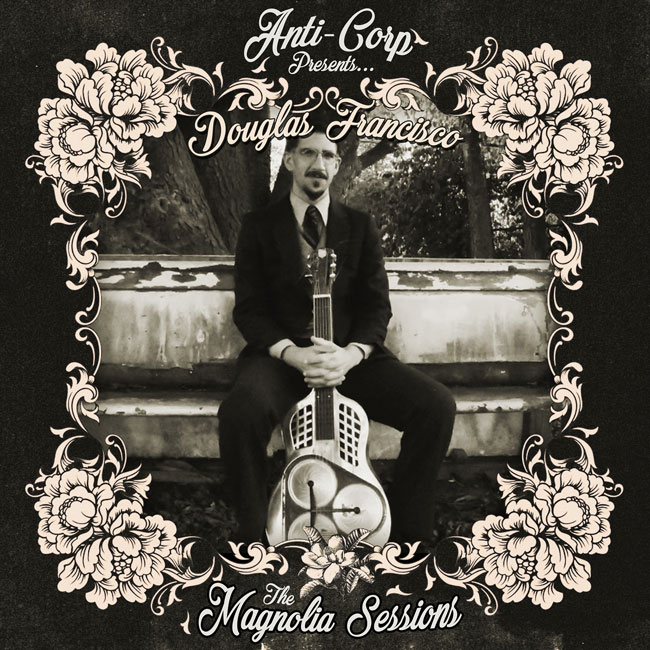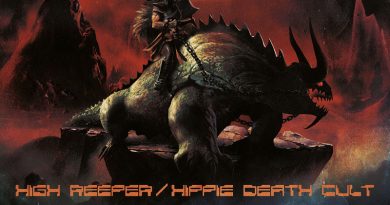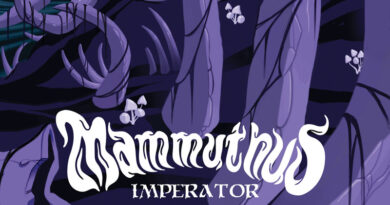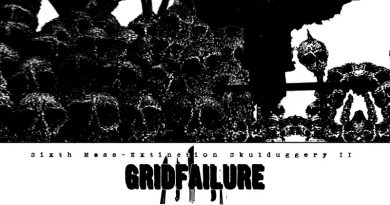Review: Douglas Francisco ‘The Magnolia Sessions’
Bringing his take on folk noir and dark country to The Magnolia Sessions is the latest recording from the enigmatic Douglas Francisco. A heavy metal musician in a previous life, Douglas Francisco is a person who describes himself as ‘a solitary creature before the world fashioned more of them’ and writes his folksy songs isolated at home in the woods lending a deeply introspective and often melancholic air to his compositions.

Having spent significant time busking, he met Benjamin Tod of the Lost Dog Street Band who he shared an affinity with and has also brought his considerable talents on the lap steel and slide guitar to round out their sound which can be heard on their latest album Glory.
For his own session, Francisco connected with in-town former drummer Keith Smith of The Resonant Rogues to provide percussion and the obscure instrumentalist Ben Fox who contributes upright bass and the viola de gamba to the hazy mix of tunes that were half-written, or organically conceived, in the part rehearsed/part improvised session.
Starting with the woozy plodding instrumental, No Light At The End Of The Tunnel, with its bending steel strings, each component grows in belief and stature as the track creeps by. In one of the completely improvised moments, the track finishes with the players all feeling in synch, like they had tapped into the ambience, reaching a level of understanding where the music flowed naturally. Francisco has been quoted as saying ‘it would take me longer to learn some of the instrumentals than it did to improvise them’, which is a testament to the quality of the three musicians, drawn from three different states and brought together on the day to record tunes unfamiliar to two of them, and the chemistry they had.
The first song Room Full Of Roses features a solo from the viola de gamba and its resonant timbre calling upon the New Orleans influence and ragtime sensibility of Scott Joplin. Almost lurching and swaying the mid-tempo track the track is an utterly despairing lament to a broken heart with Francisco intoning with his rich but downbeat vocal.
Followed almost tauntingly by the upbeat Lucky Penny where the bond between the musicians cements in stature as they’re not afraid to explore new sounds and dynamics, allowing each other subtle moments of interplay before Flowers On My Grave continues this jaunty sound. With its Cajun swing flavour, it’s a toe-tapping number that juxtaposes the seemingly sombre funeral lyrics that celebrate the life of someone who ‘has been satisfied’.
One of the sessions strongest moments is followed immediately by the powerful If Rain Is What You Want where Francisco’s earnest and lonely lyrics grow in power, and he addresses the lover who wronged him. Seemingly walking the line between a soft recalling and a towering warning, the song builds to the last line delivered with all the conviction of someone searching for justice.
Immediately after is the live version of the previously released I Hate The Sun. Once again Fox’s bass and the brushed strokes of Smith give a deep smooth feel and pulsing heart to the music that is as old as the genre itself, allowing the steel guitar to dance, bend, and slide in that way that only this type of music can connect with.
The Yiddish Eastern European influences that run alongside the Deep South swing permeate the session…
Exile harks back to the soft creeping sound of the opening track before Over And Over continues with the playful nature of pairing the jaunty swing with the promise of isolation and yearning for love which seems to form a central theme to the music. The swishing of brushes and stabs of the viola de gamba bounce off each other seamlessly before the slow crowing of Listening To The Rain Fall brings a wistful quiet to the proceedings.
The Sleeping Shaman featured track Blasphemy combines that shuffle feel and almost hoarse despair in a powerful lament that encompasses belief, soul searching and shows off the dark undertones. The Yiddish Eastern European influences that run alongside the Deep South swing permeate the session and drifts into the similarly themed It’s Bad For Me.
Finishing with the longest track, the melancholy instrumental of Time Alone Will Tell, ensures the session finishes with that lazy sounding sway of late-night campfire embers as the whiskey bottle is getting low and eyelids are heavy after a long day, somehow haunting and yet comforting at the same time.
Francisco and his hastily assembled, yet incredibly competent cohorts manage, in these twelve understated tracks, to take you on an uncomfortable trip through the dark side of the psyche, complex and never really providing a satisfying answer. Unlike some of the artists Emery has recorded, you can never quite say the message here is ‘Everything is bad right now, but hold out for hope’ as there is no definite lesson learned or an expectation for the future, but there is a rich connection to the self.
On the surface, the intimate stripped-down nature of this session doesn’t feel like it does justice to the immense skill of the ad hock nature of this performance. Executed by people who, through the troubadour traditions, have a long history of arriving at a place, hooking up with other likeminded musicians, and creating on the spur of the moment an improvised, free flowing set of compositions that can reach depths of feelings that an arranged, orchestrated and dissected prewritten works can only dream of.
The beauty of The Magnolia Sessions is more than the sum of their parts and in Douglas Francisco’s contribution to this unique series, Emery has captured an artist who may not seemingly connect as instantly as some of the others but yields an emotional gravitas and musical beauty that should not be overlooked.
Label: Anti-Corporate Music
Band Links: Official | Facebook | Bandcamp | Instagram
Scribed by: Mark Hunt-Bryden



